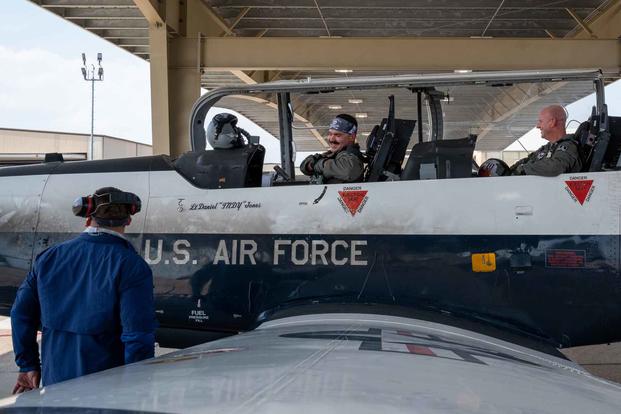The Air Force will miss the projected number of new pilots it hoped to train in fiscal 2023, falling roughly 120 aviators short of its goals at least partly due to mechanical issues with training aircraft.
With little more than a week until the fiscal year ends Sept. 30, the Air Force is set to finish with 1,350 new aviators instead of 1,470, according to 19th Air Force spokesman Benjamin Faske.
The service has averaged around 1,300 new pilots each year for nearly a decade. Recent shortages have been attributed to a range of issues such as delays in getting new engines into T-38 Talon training jets, a lack of instructors and longer waiting times for fresh airmen.
The 19th Air Force commander, Maj. Gen. Clark Quinn, in an emailed statement to Military.com, said the T-38 Talon training jet engine issue has harmed the Air Force's schedule of getting budding pilots the experience they need.
"The specific problem with the engines, it's been about a year and a half to two years now," Quinn said in the emailed statement. "We dialed back flying hours just a little over a year ago. It has not gotten worse, but it has also not gotten better. It's pretty much stagnated where it is."
Additionally, thunderstorms that ran through Oklahoma this summer damaged more than a dozen T-6A Texans, a two-seat training aircraft that entered the fleet in 2000, at Vance Air Force Base, contributing to even more delays.
The Air Force plans to eventually replace the aging T-38 Talon, a training jet used by the service since the 1960s, with the new T-7A Red Hawk trainer.
That new jet was expected to be delivered to the service this year, but software issues and concerns connected to the ejection system caused multiple delays, pushing the timeline for having a full fleet from 2024 to 2027.
Last week, the Air Force accepted its first aircraft of the T-7A and will soon begin testing it.
But in addition to the mechanical issues with the training aircraft causing delays, other issues persist.
Faske pointed to a buildup in pilot recruits waiting to join training. As of August, a little more than 900 future aviators were waiting to get into the classroom.
"The number currently is just over 900, with about 25% waiting less than 3 months, the majority waiting 3 to 9 months and about 25% that had a 9+ month wait," Faske said.
In fiscal 2022, training produced 1,276 new pilots, a decrease from the 1,381 produced the year prior, which Faske attributed to "continued challenges with civilian simulator instructor manning levels, T-6 supply shortfalls, and T-38 engine overhaul delays."
In recent years, the Air Force has experienced a wide-ranging pilot shortage. Air Force Secretary Frank Kendall said during a budget briefing with reporters in March that the service has been working on that issue from several angles, including bonuses.
"We do have a [pilot] shortage," Kendall said. "We're having to try to improve the efficiency of the pipeline to get more people in. The reserve and Guard equation is a little more complicated, but we do have some shortages there that we're trying to address as well."
The Air Force's issue with pilot recruitment, training and retention is not new. The service has struggled with a pilot shortage for nearly a decade, often landing anywhere between 1,500 to 2,000 aviators shy of requirements, Military.com has previously reported.
To address that, the Air Force has offered several incentives to retain the pilots it has, including, most recently, the Legacy Aviation Bonus Program.
The service has set a goal of training 1,500 new pilots in fiscal 2024, Faske said.
-- Thomas Novelly can be reached at thomas.novelly@military.com. Follow him on Twitter @TomNovelly.
Related: Air Force to Its Experienced Pilots: Here's $50,000 to Extend Your Service











